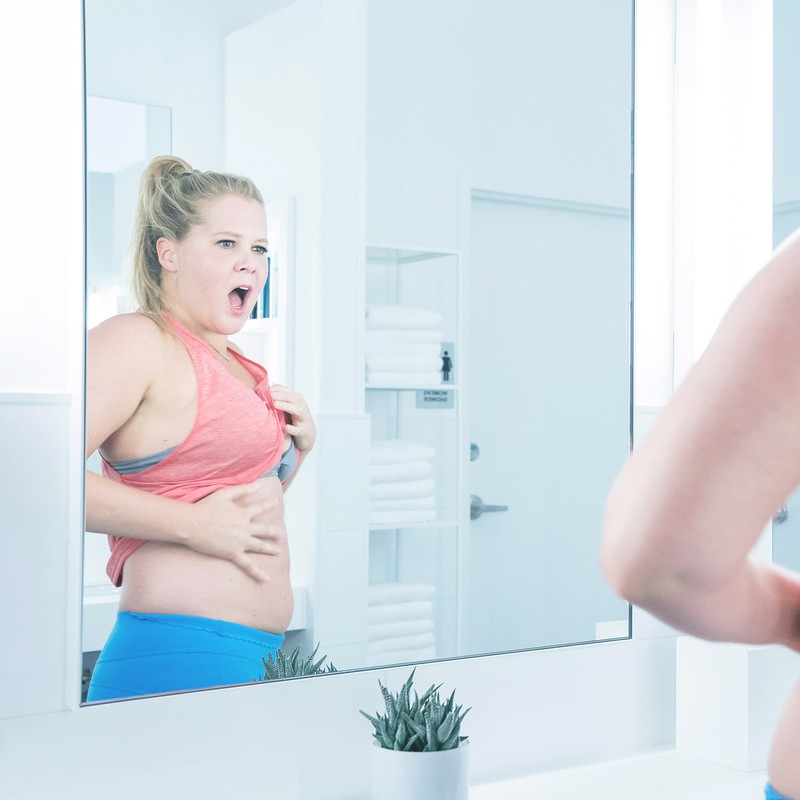I Feel Pretty Review
The directorial debut of Abby Kohn and Marc Silverstein (writers of Never Been Kissed and He’s Just Not That Into You), I Feel Pretty imagines what life would be like without the constant stream of self-criticism so many women experience. Comedian Amy Schumer stars as Renée, a twentysomething New Yorker made to feel ashamed of her looks by patriarchal body-image standards imposed by media and fashion. She longs for more – in her career, in her love life – but doesn’t know how to get it. Until, one day, she hits her head during SoulCycle session and wakes up believing she’s society’s ideal (or, as she exclaims, “A Kardashian – one of the Jenner ones!”). Cue Renée, facing the world ablaze with confidence and her life changing drastically because of it.
Now for the fallout. Backlash online has mainly stemmed from the fact that Schumer isn’t unattractive – yet is portrayed in part of the film as so. “Amy Schumer is blonde, white, able-bodied, femme and yes, thin. She IS society's beauty ideal,” comedian Sophie Hagen wrote on Twitter, adding that she didn’t want to live in a world where Schumer is considered ugly.
“I understand that there are people who look exactly like Amy Schumer who do feel ugly or unattractive,” Hagen continued. “But that doesn't change the fact that those people will still be treated better by society than someone actually fat, actually not white, actually not femme-passing.” Others accused the film of being “fat-phobic”, and Schumer of body-shaming both herself and others. “I’m just really tired of Amy average body Schumer trying to push this idea she’s fat,” another Twitter user wrote. “I feel she’s doing more harm than good by trying to tell people with average bodies that they’re fat and also that fat is a bad thing.”
I Feel Pretty hasn’t fared too well with film critics so far either. The Telegraph called it “cruel and self-defeating,” and “yet another film obsessed with the least interesting element of the female experience: her looks.” The Financial Times said it was “dizzy with contradictions”.
And the film is full of mixed-messages. Schumer refused to be retouched in her half-naked scenes – “You see my cellulite. You see my rolls, whatever… It's like, I feel great," she said in an interview with CBS This Morning – yet her body is frequently the butt of jokes in the film. When Renée goes to the gym, she can’t find shoes wide enough for her feet, and her exercise bike collapses under her weight.
It's a confusing message. It tells us confidence comes from within, whilst simultaneously celebrating wealth and glamour. It tells us beauty isn’t skin deep, yet it implies that thinner is better – a message never said out loud but, as New York Times writer Manohla Dargis put it, expressed each time Renée “gazes – eyes shining and widening – at another woman who looks a few dress sizes smaller than she is”. That and the fact all the women representing standard-issue beauty in the movie — Emily Ratajkowski, Michelle Williams, Naomi Campbell – are all thin.
The film has received some praise though, namely from women who say they’re “grateful” for the realistic portrayal what it’s like to suffer from low self-esteem. “To have a mainstream film even begin to address these pressures and cruelties seems big, when most movies just show perfectly thin, attractive and very wealthy people as if anyone else were abnormal or non-existent,” one woman wrote in an open letter to the NY Times.
But for all the lessons I Feel Pretty tries to teach us about beauty being skin deep, it also puts all the onus on women to improve their self-esteem, rather than criticising beauty standards as a whole. “The movie suggests that the only thing holding back regular-looking women is their belief that looking regular holds them back at all,” journalist Amanda Hess wrote in a piece accusing the film of ‘beauty standard denialism’. “The reality is that expectations for female appearances have never been higher. It’s just become taboo to admit that.”
DISCLAIMER: We endeavour to always credit the correct original source of every image we use. If you think a credit may be incorrect, please contact us at info@sheerluxe.com.


